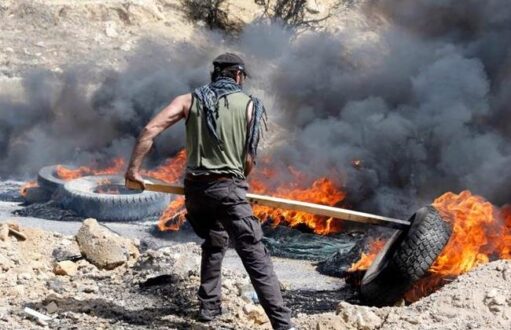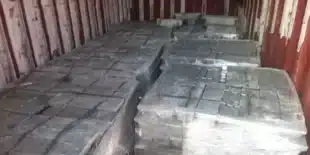BEIRUT: Lebanon’s interior minister said Wednesday for the first time that the government was not opposed to a prisoner swap with the ISIS and the Nusra Front, as the families of captive soldiers brought the country to a standstill by blocking a major highway between Beirut and the Bekaa Valley.
“A trade-off is possible,” Nouhad Machnouk said, shifting away from the government’s prior decision to suspend negotiations after Nusra and ISIS militants began executing soldiers in an effort to pressure the government to meet its requests.
Machnouk spoke to news outlets before flying to Paris, where he is set to meet Future Movement leader, former Prime Minister Saad Hariri.
More than 30 soldiers and policemen were captured by Nusra and ISIS militants during an armed attack on the northeastern border town of Arsal last month.
The two groups are said to be holding at least 21 captives. To date, the militants have beheaded two soldiers and shot another.
ISIS has asked for the release of Islamists detained in Roumieh prison, while Nusra are demanding protection for Syrian refugees and the opening of a safe passage for civilians into and out of Arsal.
The Army is wary of allowing free passage from Arsal to the outskirts, where the militants are hiding, for fear that they could receive food and aid from the town.
The government’s turnaround came a day after Hezbollah’s Secretary-General Sayyed Hasan Nasrallah declared that he was not opposed in principle to a prisoner swap. The militants have claimed in the past that Hezbollah is obstructing the negotiations for the release of the prisoners.
It also occurred as the families of the hostages escalated their protests at the government’s inaction by blocking a key thoroughfare from Beirut to the Bekaa Valley.
The protesters burned tires and erected tents in Dahr al-Baidar and before the village of Aley on the Beirut-Damascus highway.
They also partially blocked the Tarshish-Zahle road and vowed to completely block it Thursday if the government did not take action to free the captives.
The blocking of the roads came after pledges to step up protests to pressure the government into negotiating with their captors, and aimed to isolate the Bekaa from the capital and Mount Lebanon.
“We hold the government responsible for what has happened and for what might happen in the future,” said the sister of a captive soldier. She appealed to rival Lebanese politicians to act quickly to resolve the issue, calling for swapping the captive personnel with Islamist detainees held in Roumieh prison, the main demand of the militants.
“Beware of the anger of the mothers…. We want you to secure the liberation of our sons quickly,” one of the captives’ father said.
The interior minister expressed his sympathy to the families of the hostages who had blocked the arterial roads, but said that such protests do not influence the terrorists who are holding their sons hostage.
Machnouk condemned the killing of abducted Army soldier Mohammad Hamieh who was executed by Nusra militants last week and slammed last week’s roadside bombing that killed two Army soldiers in Arsal, saying the incidents are acts of terror that serve to disrupt negotiations.
Such acts targeting the Army and security forces “blatantly contradict internal and foreign efforts to find a solution to secure the return of the captives,” he said.
The persistence of terrorist assaults, according to Machnouk, proves the underlying intent of inciting sectarian strife in Lebanon in general and the Bekaa in particular.
Escalating sectarian tensions in the region “facilitates the implementation of the large conspiracy plotted against Lebanon and its people,” he said.
The interior minister called on the people of the Bekaa and the Lebanese in general, to form a unified and cohesive front in order to foil terrorist plans.
Speaking to the families of the victims, Machnouk said that “the blood of their children would not go to waste.”
The suffering of both the hostages and their families are a national responsibility and the hostage crisis will require time, said the interior minister, expressing hope that the detained would return unharmed.
But tensions in the Bekaa Valley were matched by Tripoli where unnamed militants opened fire at Army posts in Bab al-Tabbaneh, Syria Street and Barad al-Bisar, read a statement released by the Lebanese Army late Wednesday.
One soldier incurred a minor wound in his leg as a result of the Bab al-Tabbaneh attack. The soldier was rushed to the hospital for treatment.
According to the statement, soldiers at all three Army posts fired back at the militants and launched a chase in an attempt to seize the perpetrators.
The Army also cordoned off the Barad al-Bisar area and barred any cars from entering or leaving the area, a security source told The Daily Star.
However, it remains unclear whether the soldiers were capable of detaining any of the gunmen. The attacks happened at separate times throughout the day.


